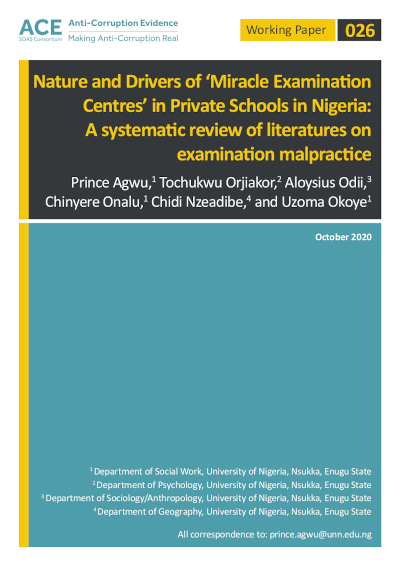
Publication Type: Working Paper
Countries: Nigeria
Authors: Prince Agwu, Tochukwu Orjiakor, Aloysius Odii, Chinyere Onalu, Chidi Nzeadibe, Uzoma Okoye
Publication date: October 2020
Keywords: Education
The education sector is listed among the top-five most corrupt sectors in Nigeria (Sahara Reporters, 2019). This is largely due to examination fraud and malpractice – in 2012 Nigeria was ranked top in the Global Examination Malpractice Index (Information Nigeria, 2012).
The so-called ‘Miracle Examination Centres’ (MECs) are mostly associated with private secondary schools and have created opportunities for candidates who sit for their Senior Secondary School Certificate Examination (SSCE) to undeservedly and corruptly achieve excellent results. This has contributed immeasurably to the decay of Nigeria’s education sector and has prompted calls for an effective anti-corruption approach.
We conducted a systematic review of available literature to understand the nature and drivers of MECs in Nigeria, and to gauge opportunities to develop an effective anti-corruption approach. After an exhaustive electronic search and screening of articles, we identified and reviewed 104 publications, comprising 50 items of grey literature and 54 journal articles.
The literature points to a proliferation of MECs across the south-south, southeast, southwest and northcentral geopolitical regions of Nigeria. MECs were almost exclusively associated with private schools, with the major drivers of such centres being the policies of schools, weak sanctions from government, and candidates who can avail of the perverse incentives presented by the former two. Agents who drive malpractice in MECs include owners of extratutorial centres, owners and principals of private schools, teachers, security agents, students and parents, among others. Some of these agents are politically connected or could pay their ways through to evade sanctions.
There is evidence that MECs have encouraged a growing distrust in the education system in Nigeria and have contributed to an unproductive and incompetent workforce in the country. However, we have also found evidence of the efficacy of certain vertical and horizontal interventions that exist.
We conclude that the integrity of Nigeria’s education system is challenged by the proliferation and activities of MECs. Although there are efforts in place to address the menace of MECs, these centres continue to thrive. Our study is the first systematic review on the subject and aims to provide a deeper understanding of the nature of MECs, what drives them and important anti-corruption measures that could be put in place to tackle this aspect of examination malpractice in Nigeria.

